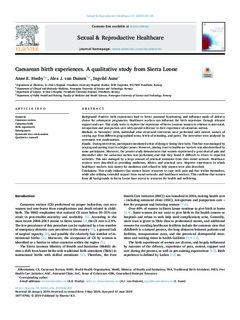| dc.contributor.author | Husby, Anne | |
| dc.contributor.author | van Duinen, Aalke Johan | |
| dc.contributor.author | Aune, Ingvild | |
| dc.date.accessioned | 2020-01-31T12:33:44Z | |
| dc.date.available | 2020-01-31T12:33:44Z | |
| dc.date.created | 2019-07-21T12:46:41Z | |
| dc.date.issued | 2019 | |
| dc.identifier.citation | Sexual & Reproductive HealthCare. 2019, 21 87-94. | nb_NO |
| dc.identifier.issn | 1877-5756 | |
| dc.identifier.uri | http://hdl.handle.net/11250/2639069 | |
| dc.description.abstract | Background
Positive birth experiences lead to better postnatal functioning, and influence mode of delivery choice for subsequent pregnancies. Healthcare workers can influence the birth experience through relevant support and care. This study seeks to explore the experience of Sierra Leonean women in relation to ante-natal, intrapartum and post-partum care with special reference to their experience of caesarean section.
Methods
In November 2016, individual semi structured interviews were performed with sixteen women of varying age from different geographical areas, levels of schooling, and parity. The interviews were analysed by systematic text condensation.
Results
During interviews, participants mentioned a fear of dying or losing their baby. This fear was managed by praying and putting trust in a higher power. However, placing trust in healthcare workers was also described by some participants. Moreover, the present study demonstrates that women experienced a great deal of pain and discomfort after the caesarean section was performed, and that they found it difficult to return to expected activities. This was managed by a large amount of practical assistance from their social network. Healthcare workers were described as providing medicines, advice, and practical care. Negative experiences in which healthcare workers took money for medicines and refused to help women were also described.
Conclusions
This study indicates that women locate resources to cope with pain and fear within themselves, while also utilising extended support from social networks and healthcare workers. This confirms that women from all backgrounds in Sierra Leone have access to resources for health and well-being. | nb_NO |
| dc.language.iso | eng | nb_NO |
| dc.publisher | Elsevier | nb_NO |
| dc.rights | Attribution-NonCommercial-NoDerivatives 4.0 Internasjonal | * |
| dc.rights.uri | http://creativecommons.org/licenses/by-nc-nd/4.0/deed.no | * |
| dc.title | Caesarean birth experiences. A qualitative study from Sierra Leone. | nb_NO |
| dc.type | Journal article | nb_NO |
| dc.type | Peer reviewed | nb_NO |
| dc.description.version | publishedVersion | nb_NO |
| dc.source.pagenumber | 87-94 | nb_NO |
| dc.source.volume | 21 | nb_NO |
| dc.source.journal | Sexual & Reproductive HealthCare | nb_NO |
| dc.identifier.doi | 10.1016/j.srhc.2019.06.003 | |
| dc.identifier.cristin | 1712209 | |
| dc.description.localcode | This article is available under the Creative Commons CC-BY-NC-ND license and permits non-commercial use of the work as published, without adaptation or alteration provided the work is fully attributed. For commercial reuse, permission must be requested. | nb_NO |
| cristin.unitcode | 1920,13,0,0 | |
| cristin.unitcode | 1920,2,0,0 | |
| cristin.unitcode | 194,65,15,0 | |
| cristin.unitcode | 194,65,20,0 | |
| cristin.unitname | Kvinneklinikken | |
| cristin.unitname | Kirurgisk klinikk | |
| cristin.unitname | Institutt for klinisk og molekylær medisin | |
| cristin.unitname | Institutt for samfunnsmedisin og sykepleie | |
| cristin.ispublished | true | |
| cristin.fulltext | original | |
| cristin.qualitycode | 1 | |

